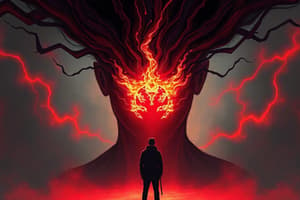Podcast
Questions and Answers
Which theory examines how social structures influence criminal activity?
Which theory examines how social structures influence criminal activity?
- Strain Theory (correct)
- Psychological Theory
- Social Disorganization Theory (correct)
- Labeling Theory
What does Feminist Criminology primarily focus on?
What does Feminist Criminology primarily focus on?
- Labeling effects in criminal justice
- Influences of gender inequality on crime (correct)
- Cultural norms regarding crime
- Developing crime prevention strategies
How do cultural influences affect perceptions of crime?
How do cultural influences affect perceptions of crime?
- They have no significant effect on crime perceptions.
- They eliminate any crime-related stereotypes.
- They dictate legislation regarding criminal procedures.
- They shape values and beliefs surrounding criminal behaviors. (correct)
What aspect of social control is emphasized in Crimsoc?
What aspect of social control is emphasized in Crimsoc?
Which critical issue is debated in relation to socioeconomic status?
Which critical issue is debated in relation to socioeconomic status?
Which method is NOT commonly utilized in Crimsoc research?
Which method is NOT commonly utilized in Crimsoc research?
What does Labeling Theory suggest about societal labels?
What does Labeling Theory suggest about societal labels?
What significant issue does Race and Crime explore?
What significant issue does Race and Crime explore?
Flashcards are hidden until you start studying
Study Notes
Crimsoc
Overview
- Crimsoc, or Criminal Sociology, is the study of social factors related to crime, criminal behavior, and societal reactions to crime.
- It integrates principles from sociology, criminology, and social psychology.
Core Concepts
-
Social Structure and Crime
- Examines how social structures (e.g., economic status, family, education) influence criminal activity.
- Includes theories such as Strain Theory and Social Disorganization Theory.
-
Cultural Influences
- Investigates how cultural norms, values, and beliefs affect criminal behavior and perceptions of crime.
- Considers subcultures and their role in shaping criminal activities.
-
Social Control
- Explores the mechanisms societies use to regulate behavior and norms (e.g., laws, informal social controls).
- Emphasizes the concept of community and collective efficacy in preventing crime.
-
Labeling Theory
- Focuses on the significance of societal labels in the development of criminal identity.
- Suggests that being labeled as “deviant” can lead to a self-fulfilling prophecy.
-
Feminist Criminology
- Examines crime through a gendered lens, analyzing how gender inequality influences crime rates and criminal justice responses.
- Highlights issues related to violence against women and the justice system's treatment of female offenders.
-
Race and Crime
- Studies the intersection of race, ethnicity, and crime, emphasizing systemic inequalities in the criminal justice system.
- Discusses racial profiling and the disproportionate impact of crime on minority communities.
Research Methods
- Utilizes qualitative and quantitative research methods:
- Surveys and interviews to gather personal narratives.
- Statistical analysis to identify crime trends and patterns.
- Case studies to explore specific incidents or groups.
Applications
- Informing public policy and law enforcement strategies.
- Developing prevention and intervention programs.
- Enhancing understanding of the social dynamics influencing crime and societal responses.
Key Figures
- Emile Durkheim: Father of sociology; explored social factors in crime and suicide.
- Howard Becker: Developed Labeling Theory.
- Jackson Toby: Contributed to Strain Theory.
Critical Issues
- The ongoing debate regarding the impact of socioeconomic status on crime rates.
- Ethical considerations in crime research, especially regarding vulnerable populations.
- The implications of technology and social media on crime and social behavior.
Crimsoc: Overview
- Crimsoc (Criminal Sociology) studies the social factors that contribute to crime, criminal behavior, and society's response to crime.
- It combines elements of sociology, criminology, and social psychology.
Crimsoc: Core Concepts
- Social Structure and Crime: Studies how social structures (e.g., economic status, family, education) influence criminal behavior.
- Includes theories like Strain Theory (social pressures and lack of opportunities cause crime) and Social Disorganization Theory (weak social ties in neighborhoods lead to crime).
- Cultural Influences: Investigates how cultural norms, values, and beliefs impact criminal behavior and perceptions of crime.
- Considers subcultures (groups with distinct values and beliefs) and their role in shaping criminal activities.
- Social Control: Examines the methods used to regulate behavior and norms (e.g., laws, informal social controls).
- Emphasizes the importance of community and collective efficacy (a shared belief in the ability to solve problems) in preventing crime.
- Labeling Theory: Focuses on the impact of societal labels on the development of criminal identity.
- Argues that being labeled as “deviant” can lead individuals to fulfill that label, potentially leading to further criminal behavior.
- Feminist Criminology: Examines crime through a gendered lens, analyzing how gender inequality influences crime rates and the justice system’s responses.
- Highlights issues related to violence against women and the justice system's treatment of female offenders.
- Race and Crime: Studies the intersection of race, ethnicity, and crime, focusing on systemic inequalities in the criminal justice system.
- Discusses racial profiling and the disproportionate impact of crime on minority communities.
Crimsoc: Research Methods
- Crimsoc uses a mix of qualitative and quantitative methods:
- Surveys and interviews gather personal narratives and insights.
- Statistical analysis identifies crime trends and patterns.
- Case studies explore specific incidents or groups in-depth.
Crimsoc: Applications
- Crimsoc findings inform public policy, law enforcement strategies, and the development of prevention and intervention programs.
- It helps us understand the social dynamics that influence both crime and societal responses to crime.
Crimsoc: Key Figures
- Emile Durkheim: Considered the father of sociology, studied social factors in crime and suicide.
- Howard Becker: Developed Labeling Theory.
- Jackson Toby: Contributed to Strain Theory.
Crimsoc: Critical Issues
- Ongoing debate about the link between socioeconomic status and crime rates.
- Ethical considerations in crime research, particularly when dealing with vulnerable populations.
- The impact of technology and social media on crime and social behavior.
Studying That Suits You
Use AI to generate personalized quizzes and flashcards to suit your learning preferences.




